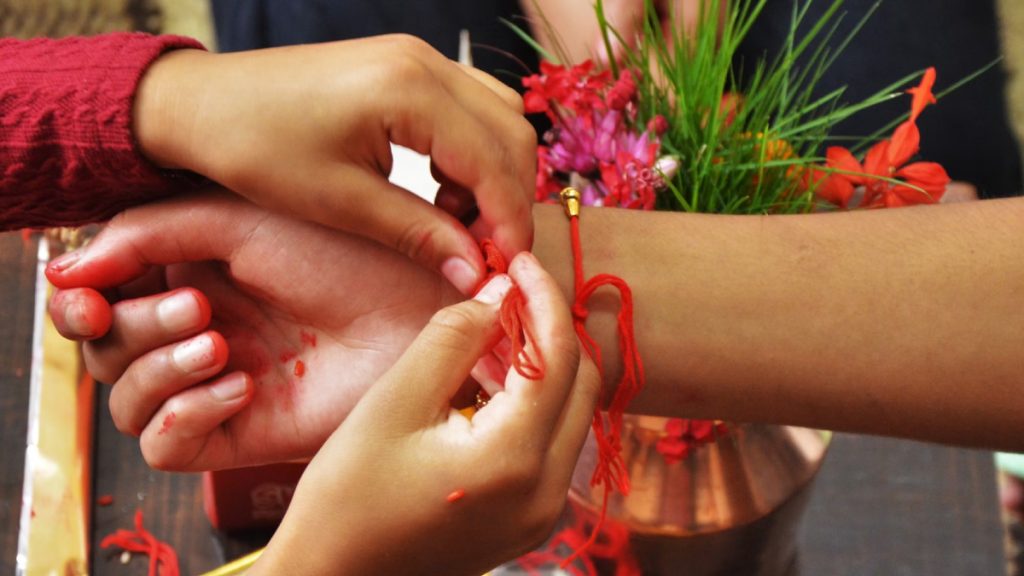Raksha Bandhan, popularly known as Rakhi, is a significant Hindu festival that celebrates the bond between brothers and sisters. The festival is marked by the tying of a sacred thread (rakhi) by sisters on their brothers’ wrists, symbolising their love, prayers for their well-being, and a promise of protection.
Brothers, in return, give gifts to their sisters and pledge to protect them from all harm. Raksha Bandhan is a day of family togetherness, marked by rituals, feasts, and the exchange of gifts. The festival is observed with great enthusiasm across India and is an important occasion in Indian families.
Table of Contents
Raksha Bandhan Dates in India for 2024, 2025, and 2026
Here are the dates for Raksha Bandhan in India for the upcoming years:
The Significance of Raksha Bandhan in India
Raksha Bandhan holds deep cultural and emotional significance in India. It celebrates the sacred bond of protection between brothers and sisters, fostering family ties and strengthening relationships. The festival transcends biological relationships, as rakhis are often tied to cousins, close friends, and even those who are considered brothers or sisters by affection.
Historically, Raksha Bandhan has also symbolised protection beyond the familial sphere. In ancient times, rakhis were tied to warriors by women, seeking protection for their homes and communities. The festival signifies the values of loyalty, protection, and mutual care in relationships.
How Raksha Bandhan is Celebrated in India
Raksha Bandhan is celebrated with rituals, the exchange of gifts, and family gatherings. The festival’s central ritual involves sisters tying the rakhi on their brothers’ wrists, followed by prayers, blessings, and the sharing of sweets.
- Tying of Rakhi: The tying of the rakhi is the most significant ritual of Raksha Bandhan. Sisters prepare a thali (plate) with rakhi, rice, sweets, and a diya (lamp). They perform a small puja (prayer) and apply a tilak (vermilion mark) on their brothers’ foreheads before tying the rakhi on their wrists. This act symbolises the sister’s prayers for her brother’s well-being and the brother’s vow to protect her.
- Exchange of Gifts: After the rakhi is tied, brothers give gifts to their sisters as a token of appreciation and love. These gifts can range from traditional items like sweets and clothes to modern-day gifts such as jewellery, gadgets, or money. The exchange of gifts adds joy to the celebrations and strengthens the bond between siblings.
- Family Gatherings and Feasts: Raksha Bandhan is also a time for family reunions. Families gather to celebrate the festival with prayers, rituals, and festive meals. Traditional dishes and sweets such as kheer, laddoo, and barfi are prepared and shared among family members. The festival fosters a sense of togetherness and love within the family.
- Celebrations Beyond Families: In some regions, Raksha Bandhan extends beyond familial relationships. Sisters may tie rakhis to close friends, cousins, and even individuals they consider brothers through affection. This practice reflects the inclusive and universal message of protection and care that the festival embodies.
Raksha Bandhan in Different Parts of India
Raksha Bandhan is celebrated with slight variations across different regions of India, reflecting the country’s cultural diversity.
- North India: In northern states like Uttar Pradesh, Punjab, and Haryana, Raksha Bandhan is celebrated with great fervour. The day begins with sisters performing the rakhi ceremony, followed by prayers and family gatherings. Brothers often travel long distances to be with their sisters on this day.
- Western India: In Maharashtra and Gujarat, Raksha Bandhan is celebrated with similar enthusiasm. In Maharashtra, the festival coincides with Narali Purnima, a festival dedicated to the sea, where fishermen offer coconuts to the sea god for protection and prosperity.
- Eastern India: In states like West Bengal, Odisha, and Assam, Raksha Bandhan is celebrated as Rakhi Purnima. In addition to the usual rituals, the festival holds social and cultural significance. In some regions, women tie rakhis to trees and plants, symbolising the protection of nature.
- South India: Although Raksha Bandhan is primarily a North Indian festival, it is celebrated in parts of South India, particularly in Tamil Nadu, Andhra Pradesh, and Karnataka. In these regions, the festival is observed with prayers, family gatherings, and the tying of rakhis to brothers.
Raksha Bandhan – A Celebration of Love, Care, and Protection
Raksha Bandhan is a beautiful celebration of the bond between brothers and sisters. It serves as a reminder of the importance of family, love, and mutual care. The festival encourages siblings to express their love and gratitude for each other, while also upholding the values of loyalty, protection, and unity.
Beyond the familial sphere, Raksha Bandhan also represents the broader ideals of care and protection within society. The act of tying a rakhi extends beyond blood relations, symbolising a universal message of love, compassion, and the duty to protect one another.
More Information about Raksha Bandhan in India
Is Raksha Bandhan a public holiday in India?
Raksha Bandhan is observed as a restricted public holiday in many states across India. While it is not a national holiday, it is widely celebrated with family gatherings, rituals, and cultural events.
How is Raksha Bandhan celebrated in India?
Raksha Bandhan is celebrated with the tying of a rakhi by sisters on their brothers’ wrists, symbolising protection. The ritual is followed by prayers, the exchange of gifts, and festive meals, bringing families together in a spirit of love and togetherness.
What is the significance of Raksha Bandhan in Indian culture?
Raksha Bandhan signifies the bond of protection and care between brothers and sisters. It celebrates the values of loyalty, love, and duty, with brothers pledging to protect their sisters, and sisters offering prayers for their brothers’ well-being.
Where are the major Raksha Bandhan celebrations held in India?
Raksha Bandhan is celebrated throughout India, particularly in the northern and western states. The festival is marked by family gatherings, prayers, and cultural events in cities and villages across the country.

